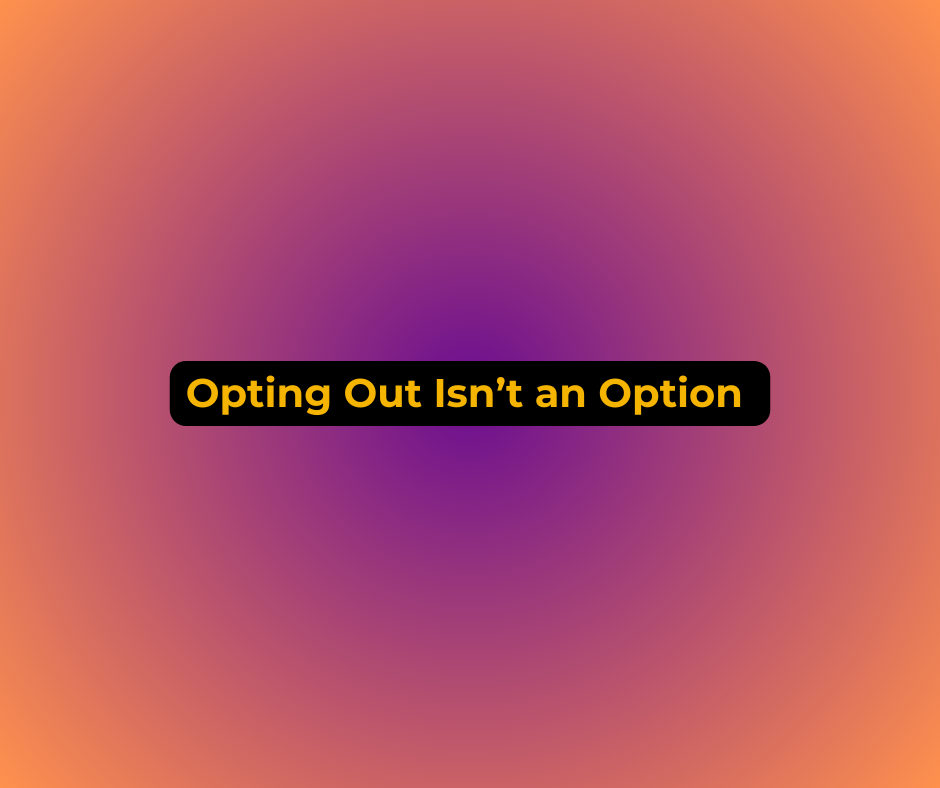
Stardust Story: I Can't Opt Out
Hi Galactic Star, 🌟
Let’s fire up the cosmic time machine and orbit back to a moment that still echoes in my bones.
Have you ever had one of those moments where your whole body just says, “Nope. This isn’t it.” That gut feeling that something just doesn’t sit right, and yet, when you speak up, it feels like your words are just floating through space, unheard?
That’s what happened to me back in 2022. I was tasked with creating a new recognition program at work that would integrate into our Human Resources Information System (HRIS). The program was designed to celebrate values within the organization. One of those values was “We are committed to anti-racism.”
Now, you might think that’s a solid value, right? And it is, don’t get me wrong. Anti-racism is absolutely vital. But as a Black person - a Person of Color (POC) - I knew immediately that something about that phrasing for a recognition program just didn’t sit right with me. Because here’s the truth: I don’t get to opt out of being anti-racist and being "recognized" for that at work just doesn't align for me.
Let me explain.
I Can’t Opt Out
The program’s idea was that employees could recognize each other when demonstrating the company’s values. But the phrase “We are committed to anti-racism” didn’t land the way they thought it would.
Imagine, as a POC, receiving recognition from a white colleague for being "committed to anti-racism," as if it’s a voluntary action, not a lived necessity.
When I brought this up to my supervisors at the time, two white women in leadership, I explained how odd it felt to be recognized for something I have no choice but to live out daily.
According to Merriam-Webster:
- The definition of being anti-racist is being "opposed to racism."
- The definition of racism is "a belief that race is a fundamental determinant of human traits and capacities and that racial differences produce an inherent superiority of a particular race."
- The definition of race is "any one of the groups that humans are often divided into based on physical traits regarded as common among people of shared ancestry."
These aren't just academic terms; they shape how people like me navigate the world daily.
Anti-racism isn’t a badge I wear when it’s convenient or a value I can choose to display when I feel like it. It’s literally woven into the fabric of my survival.
When I brought this up, the response I got was, “Well, that’s how values work.”

And I just sat there, trying to put into words why that statement to me is clearly missing the point. Values aren’t supposed to feel like a checkbox or a transactional system. Values are something we constantly work toward, they’re not fixed, but guiding principles we strive to live by. When you’re a POC, you don't get to just opt in or out of being anti-racist. It’s not a choice. For me it is a commitment that’s expected of me simply because of who I am, my ancestors, and our history.
From a POC point of view, that kind of recognition felt hollow, like being handed a participation badge for surviving racism, as if I chose this path instead of it being part of my lived reality. It would feel performative and hollow. I knew that wasn’t the intention, but intention doesn’t always match impact.
I would have felt differently if the value was framed as “We are committed to DEI” (Diversity, Equity, and Inclusion), something that encompasses a collective effort. But DEI points to a shared responsibility, something we all build together, whereas anti-racism, especially when applied to me as a Black person, would feel more like a participation badge for something I never even had a choice in.
The Reality of Opting Out
This experience reminded me of something else that rubbed me the wrong way. In a recent season of Love Is Blind, a white cis man casually admitted that he didn’t vote and didn’t care about Black Lives Matter, he said he just “chooses to opt out.” And that was another reminder in our current time that privilege means having the ability to choose ignorance.
For so many of us, especially those of us who are POC, queer, trans, or otherwise marginalized, opting out is not an option.
We don’t get to be neutral or uninformed because our very existence challenges the norms.
It’s disappointing to see people treat activism and awareness as nice to-haves or optional values when they’re a constant in our lives.
Why This Matters
I share this story because I know I’m not alone in feeling this way. Sometimes it’s exhausting trying to make people understand why something doesn’t work or why it feels off, especially when your perspective isn’t the dominant one. And honestly, it’s disappointing to feel like your words aren’t fully heard or understood.
I didn’t want to be recognized for being committed to anti-racism because that’s not a choice I get to make. And if you’re reading this and relating, know that your feelings are valid. You don’t owe anyone an explanation for why something feels wrong to you. You deserve to be seen, heard, and valued without your identity being reduced to a checkbox.
So, if you’re someone who can opt out, I hope you choose not to. Because solidarity means listening, believing, and acting, even when you have the privilege of walking away.
With Resilient Stardust,
Kassidy
~~~~~~~~~~~~~~~~~~~~~~~~~~~~~~~~~~~~~~~~~~~~~~~~~~~
Sources
“Definition of ANTI-RACIST.” Www.merriam-Webster.com, www.merriam-webster.com/dictionary/anti-racist.
“Definition of RACISM.” Merriam-Webster.com, 2022, www.merriam-webster.com/dictionary/racism.
“Definition of RACE.” Merriam-Webster, 2019, www.merriam-webster.com/dictionary/race.
